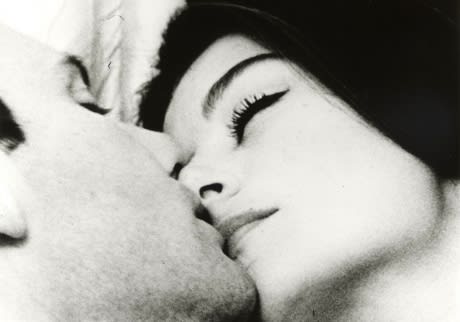Made when director Claude Lelouch was only 28-years-old with a mixture of colour, sepia and black and white film because of budgetary incentives, A Man and a Woman has held up through time as an impressionist, romantic take on the tender caution and danger of establishing human connection. It blends art with narrative and metaphor, tackling the nature of perception and the duality of nascent relationship with simultaneous scrutiny and whimsy.
Simply enough, this commercially successful mid-'60s art film follows the relationship between Anne (Anouk Aimée) and Jean-Louis (Jean-Louis Trintignant), a widow and widower, after they meet at Deauville, a boarding school their respective children attend. Offering Anne a ride home after she misses her last train, Jean-Louis gently probes her for information, learning of her work in the film industry and her marriage to a stunt man.
But rather than relegating background character information to expository descriptions or overly contrived and awkwardly concise flashbacks, Lelouch inserts flashback imagery, free from dialogue and specific context into the conversation. The result is that of slow understanding and context for these characters, as juxtaposed with their own guarded nature and tentative handling of revealing their past and identity. Their initial misconceptions of each other—neither is initially aware that their respective spouses are deceased—are also narrative misconceptions for the audience, giving us a way to access and engage in their developing connection.
Mirroring their initial stabs at romance, where the more damaging and painful aspects of their lives are slowly revealed, is Jean-Louis' career as a race car driver, which similarly requires caution and focus for success. Much as his tight turns around the icy terrain of the Monte Carlo Rally has the potential for disaster with a single false move, their efforts to bond are riddled with possible missteps and assumptions that could quickly disintegrate any established feelings.
This understanding of relationships as a fragile, slowly developing and strengthening entity, is what sets Lelouch's love story apart from the many other tragic, artsy conversation pieces of the time. He gets below the artifice and idealism of it all to reveal the complexities of perception and past signifiers during the process of pair bonding.
A Man and a Woman screens at the TIFF Bell Lightbox as part of the Man and a Woman: Jean-Louis Trintignant and Emmanuelle Riva retrospective series on Sunday, January 13th, 2013 at 7pm.
(Warner)Simply enough, this commercially successful mid-'60s art film follows the relationship between Anne (Anouk Aimée) and Jean-Louis (Jean-Louis Trintignant), a widow and widower, after they meet at Deauville, a boarding school their respective children attend. Offering Anne a ride home after she misses her last train, Jean-Louis gently probes her for information, learning of her work in the film industry and her marriage to a stunt man.
But rather than relegating background character information to expository descriptions or overly contrived and awkwardly concise flashbacks, Lelouch inserts flashback imagery, free from dialogue and specific context into the conversation. The result is that of slow understanding and context for these characters, as juxtaposed with their own guarded nature and tentative handling of revealing their past and identity. Their initial misconceptions of each other—neither is initially aware that their respective spouses are deceased—are also narrative misconceptions for the audience, giving us a way to access and engage in their developing connection.
Mirroring their initial stabs at romance, where the more damaging and painful aspects of their lives are slowly revealed, is Jean-Louis' career as a race car driver, which similarly requires caution and focus for success. Much as his tight turns around the icy terrain of the Monte Carlo Rally has the potential for disaster with a single false move, their efforts to bond are riddled with possible missteps and assumptions that could quickly disintegrate any established feelings.
This understanding of relationships as a fragile, slowly developing and strengthening entity, is what sets Lelouch's love story apart from the many other tragic, artsy conversation pieces of the time. He gets below the artifice and idealism of it all to reveal the complexities of perception and past signifiers during the process of pair bonding.
A Man and a Woman screens at the TIFF Bell Lightbox as part of the Man and a Woman: Jean-Louis Trintignant and Emmanuelle Riva retrospective series on Sunday, January 13th, 2013 at 7pm.
